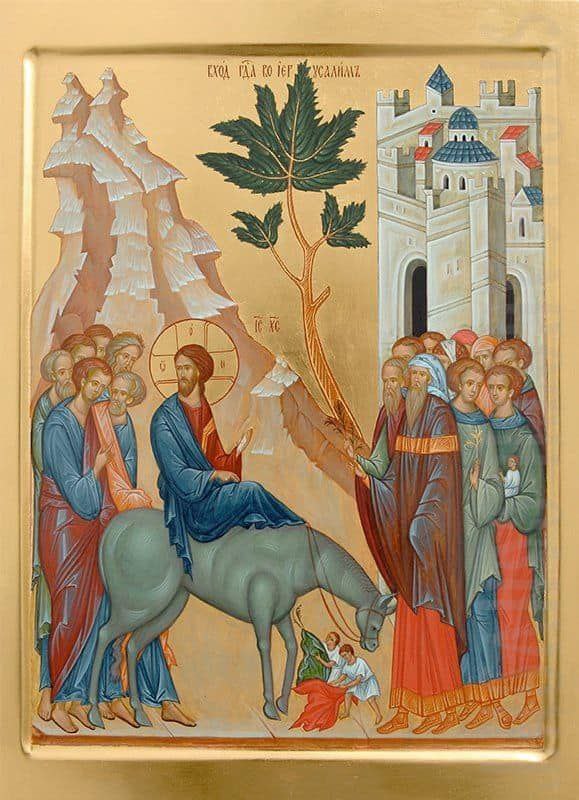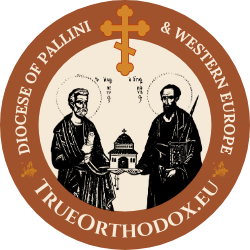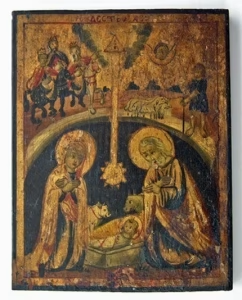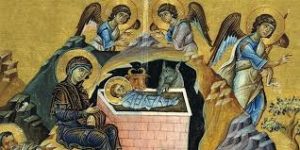The Lord’s Entry into Jerusalem

by Priest Aleksandar Radunovic
“Rejoice greatly, O daughter of Zion; shout, O daughter of Jerusalem: behold, thy King cometh unto thee; He is just and having salvation; lowly, and riding upon an ass, and upon a colt the foal of an ass.” (Zech. 9:9)
I. The Lord comes, but not as kings come
He, Who created the world by His word, Who holds the universe by His thought, Who commands the stars and the angels—He enters the city of men riding on a donkey. Not in a golden chariot, not on a horse of victory, but on the humble beast of poverty. He does not come to take the throne, but to ascend the Cross¹. He does not come to be worshiped, but to be spat upon. He comes not to reign, but to be condemned.
Jerusalem cries out: “Hosanna to the Son of David!”; but within that cry lies the hidden hatred of the same mouths that will soon shout: “Crucify Him!” The people gather not for repentance, but for the miracle of Lazarus. Olive branches are waved, cloaks are spread—but hearts are empty. All is outward glory, but within—death is already knocking².
He knows this. He goes knowingly. He does not flee. For every Gospel leads to the Cross, and every righteousness to suffering.
II. And they cry to Him: “Hosanna!”—but it is not faith
“And the multitude that had come to the feast, when they heard that Jesus was coming to Jerusalem, took branches of palm trees and went forth to meet Him, and cried: Hosanna! Blessed is He that cometh in the Name of the Lord, the King of Israel.” (John 12:12–13)
Oh, that cry! But who uttered it? Those who sought the multiplication of bread. Those who saw miracles but did not behold His Face. Those who desired a king fashioned to their sin, not God fashioned to eternity. It was not the voice of faith, but the voice of passion³.
That crowd did not await the Cross; but a crown. They did not seek a Savior from sin; but a liberator from Rome. They did not love Christ; they used His power. Therefore, the same hands that waved branches will soon ask for Barabbas⁴.
In this is our warning. For we too often glorify Christ only when He does our will. When He comes with a whip, we do not recognize Him. When pain comes instead of a miracle, we say: “He is gone.” But He, He goes to Jerusalem—to the city where He will be betrayed, spat upon, condemned, and slaughtered as a Lamb.
III. The donkey—the Throne of the King of Glory
Why a donkey? Why not a white horse, as befits a Conqueror? Why such profound humility?
Because the donkey is unclean by the Law. A non-Jewish animal. It carries a man, but does not understand him. And Christ chooses it to show that the Kingdom of God comes not by the law of men, but by grace. He chooses what is despised, what is nothing, that in it might be glorified the Glory of the Invisible⁵.
And it was not an ordinary donkey. For no man had ever sat upon it. Just as no one had lain in Christ’s tomb before Him, so had that animal borne no other. It was the Throne of Divine Humility.
IV. And the city was moved—not to repentance, but to fear
“And when He had come into Jerusalem, all the city was moved, saying, Who is this?” (Matt. 21:10)
But hearts did not know Him. They ask: “Who is this?”; though they had already seen the resurrection of the dead, the cleansing of lepers, the casting out of demons. The world does not believe in holiness. The world seeks power. Thus it trembles, but it does not repent. It marvels, but it does not change. And so it is today.
The city that bore within it the Temple of God did not recognize the Visitor. The Church under the shadow of the Law did not recognize the Lawgiver. This is the image of the world when grace comes: the world trembles, but remains cold. And it seeks to pull Christ from the donkey and place itself upon the throne.
V. The Lord’s first tears of Holy Week
“And when He drew near and saw the city, He wept over it, saying: If thou hadst known, even thou, at least in this thy day, the things which belong unto thy peace! But now they are hidden from thine eyes.” (Luke 19:41–42)
He weeps. In the moment of glory. While they cry “Hosanna!”, He weeps. For He knows that they will soon cry: “Crucify!” He sees hearts. He does not entrust Himself to men, for He knows what is in man⁶. He beholds Jerusalem—the city of prophets, the city of the Church, the city of promise—and weeps, for it does not recognize its Visitation.
These are tears of love, not weakness. Tears of omniscience, not emotion. The tears of One who loves, but is rejected. Christ’s tears are not like ours; they are part of His dispensation of salvation. They are the seal of God’s sorrow—that He gives man freedom, and man chooses death.
VI. The King of Glory passes through our Jerusalem
We too have our Jerusalem. Within it is the Temple of the body. Within it, the altar of the heart. But do we recognize Him when He comes meekly, not with thunder but with silence? Do we also cry “Hosanna!” when all goes well, only to shut the door when He asks of us the Cross?
He enters every Jerusalem. Mine and yours. But He comes on a donkey, not in strength. He comes in the voice of conscience, in the tear of repentance, in the cry of a child, in the wound of another. He does not come as thunder, but as a whisper. But he who has a heart will recognize Him.
VII. Beyond the Palm—there is the Cross
This is not the end. This is the beginning. Palm Sunday is not the crown, but the prologue. He goes to Bethany, thence to the Mystical Supper, thence to Gethsemane, and from there to Golgotha.
The Entry into Jerusalem is the declaration of war against hell. By this entry, He accepts the Cross. He accepts to be rejected, to be betrayed, to be slaughtered. And yet, He enters—He does not hesitate, He does not waver. For He came not to be glorified, but to be given. Not to take the kingdom of this world, but to conquer it through sacrifice.
FOOTNOTES:
The Cross as throne – According to the Holy Fathers, the Cross of Christ is not humiliation but a royal throne (St. John Chrysostom). The Entry into Jerusalem is a liturgical entry into the Holy of Holies—Golgotha.
Outward religion – St. Theophan writes that faith without repentance and inner union with God becomes an empty ritual.
Faith of passion – If faith is founded on emotion or the expectation of miracles, it easily turns into blasphemy when it does not receive what it wants (St. Gregory Palamas).
Barabbas – A symbol of the man of the world: violent, but “useful.” People choose Barabbas because he suits their spirit better.
Liturgical symbolism of the donkey – The donkey symbolizes the Gentiles, whom Christ will receive into the New Israel.
The Lord does not trust men – John 2:24–25: “But Jesus did not entrust Himself to them, for He knew all men.”







